The 1990s were a time when Finnish hockey players became more prevalent throughout the NHL. By the time that the decade had gotten underway, three Finns already had their names inscribed upon Lord Stanley’s Cup, while a total of four had been NHL All-Stars. While the Finns of the decade prior certainly found NHL success, it was the 1990s that saw these Nordic players become more far reaching. Seemingly every NHL roster from 1990 through 2000 had a Finn.
Depending on the eye of the beholder, the 1990s to some extent were a matter of quantity over quality when it came to the Finns of the NHL. Focusing solely on the seasons of 1990-91 through 1998-99, only two Finnish-born players would win the Cup, as compared to three the decade prior. Additionally, there were only two separate instances of Finns hoisting the Cup, as opposed to the five separate times it happened from 1983-84 through 1989-90.
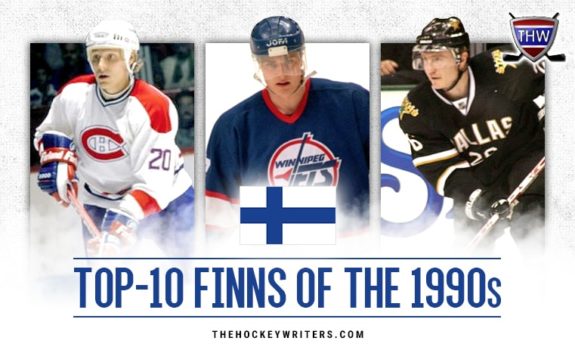
That being said, the Finns of the 1990s brought prevalence to the NHL. Furthermore, they continued to break down the perceived bias of North American NHLers as opposed to European NHLers. Finns were hockey players and they were darn good ones throughout the entire decade and into the present.
THW previously gave you the “Top-10 Finns of the 1980s”. There would definitely be some crossover in the 10 years to follow after that. Which players maintained relevancy for more than one decade? Without further adieu, we now present to you the 10 best Finns to have played in the NHL during the 1990s:
#10 Janne Laukkanen
Janne Laukkanen was a valued defenseman who helped the Ottawa Senators transition from being a basement dweller to a perennial playoff team. When Ottawa was added to the league as an expansion squad in 1992-93 they were abysmal for their first four seasons of existence – a record of 51-224-23 during that stretch. Laukkanen’s steadying presence would turn their blue line around, which bolstered the rest of the team as well. Senators goalies stopped allowed nearly 400 goals a season before he came on board in Ottawa.
Laukkanen broke into the NHL with the Quebec Nordiques during the lockout shortened 1994-95 NHL season. His first NHL goal was scored in the playoffs as the Nordiques lost to the New York Rangers in that season’s opening round.
Shortly after the Nordiques relocated to Colorado and became the Avalanche, they would ship Laukkanen to the Senators in exchange for seldom used Brad Larsen. The Avalanche would go on to win the Stanley Cup in 1995-96, but the Finnish defenseman would find a home in Ottawa. Laukkanen would remain with the Senators for 1995-96 until the trade deadline of the 1999-00 season. Ottawa would make the playoffs in each of his three full seasons with the team.
During the 1996-97 season, Laukkanen played a career high 76 games for the Sens. As he scored three goals and 18 assists across that stretch, Ottawa would make the playoffs for the very first time. In total, he played 266 games as a Senator, the majority of which were in the 1990s. During the 1999-00 season he would be traded to Pittsburgh. Laukkanen would remain there for parts of four seasons, before finishing out his career with four games for the Tampa Bay Lightning.
He makes our list at number-10 for being a steadfast defenseman that helped solidify Ottawa’s back end.
#9 Janne Niinimaa
The 1990s portion of Janne Niinimaa’s career was relatively brief, but it was productive enough to earn him a spot on our list. The Philadelphia Flyers drafted him 36th overall in the 1993 NHL Draft. Debuting for the team more than three seasons later, Niinimaa was named to the NHL’s All-Rookie Team at the end of the 1996-97 season.
It really is not surprising that he would earn such an accolade either. Niinimaa played 77 games for the Flyers that season. Within those games he scored four goals and 40 assists for 44 points. The Flyers could obviously count on him at a young age, and his performance enabled him to finish fourth in voting for the Calder Trophy that season as the NHL’s Rookie of the Year.
The icing on the cake was that Niinimaa helped the Flyers reached the Stanley Cup Final, where they would ultimately be swept in four games by the Detroit Red Wings. Despite a quick exit, Niinimaa generated three assists while playing in all four games of the Final. This tied him for second in scoring among Philadelphia skaters in this last round of play.
Rather surprisingly, the Flyers traded Niinimaa in the midst of his sophomore campaign. At the 1998 trade deadline, he was shipped to the Edmonton Oilers in exchange for defenseman Dan McGillis and a second round draft selection. Niinimaa remained with the Oilers for the remainder of the 1990s and on into the 2000s.
From 1996-97 through 1999-00, Niinimaa played 316 regular season games. He generated 20 goals and 128 assists for 148 points in that time.
#8 Esa Tikkanen
Esa Tikkanen was on our “Top-10 Finns of the 1980s” list, and he makes this one as well. Still with the Edmonton Oilers when the 1990s got underway, he would win his fourth Stanley Cup at the conclusion of the 1989-90 season. Tikkanen would remain in Edmonton until the 1993 trade deadline when the New York Rangers acquired him in exchange for a young Doug Weight. The move would pay great dividends for both Tikkanen and the Rangers.
When the Rangers ended their 54-year Stanley Cup drought in 1994, they did so with a roster comprised of a multitude of former Oilers – seven of them to be exact – and Tikkanen was one of them. He would score 22 goals and 32 assists for 54 points in 83 games – enough for seventh most on the team. Tikkanen also continued his penchant for antagonizing and agitating opponents, even trying to smooch members of the Washington Capitals in the second round of the playoffs. His antics, scoring touch and experience paid off though, as Tikkanen won the fifth Stanley Cup of his career and the Rangers won their first since 1940.
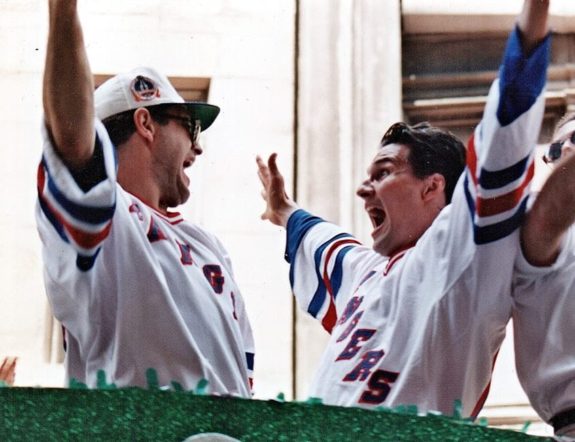
The remainder of the 1990s saw him bounce around the NHL quite a bit as teams hoped he could be the missing ingredient for their own Stanley Cup success. From 1994-95 through 1998-99, Tikkanen played for six different teams, which included a second and a third stint as a New York Ranger. He additionally suited up for the St. Louis Blues, New Jersey Devils, Vancouver Canucks, Florida Panthers and Washington Capitals. With Washington Tikkanen would have one final run at the Cup, as he helped get the 1997-98 Capitals into the Stanley Cup Final where they would be swept by the Detroit Red Wings.
From 1990-91 through 1998-99, Tikkanen played 540 regular season games in the NHL, while compiling 119 goals. His biggest moment of course was the 1993-94 Stanley Cup. True to form though, Tikkanen would record the 1,000th penalty minute of his career while playing for the Canucks during the 1996-97 season.
#7 Teppo Numminen
Teppo Numminen was “Mr. Steady” for the Winnipeg Jets/Arizona (Phoenix) Coyotes franchise for 15 seasons. While he would play a total of 20 seasons in the NHL, it was with the Jets and Coyotes that he established himself as one of the most reliable defensemen in the game. The Jets selected him early in the second round of the 1986 Draft. Numminen would join them in the NHL two seasons later.
From 1989-90 through 1998-99, the Finnish blueliner recorded eight seasons of at least 20 assists. Twice – in both 1995-96 and 1997-98 – he eclipsed the 40-assist mark. Not possessing the offensive firepower from the back end like an Al MacInnis or a Ray Bourque, Numminen was still a very gifted passer and was just as dependable of a competitor. From 1990-91 through 1991-92, and then again in 1996-97 through 1998-99, he did not miss a single regular season game for the Jets/Coyotes.
For the 1997-98 season, Numminen compiled 11 goals, 40 assists and 51 points in 82 games. Subsequently, he finished ninth in voting for the James Norris Memorial Trophy as the NHL’s Best Defenseman. Then in 1998-99, as he scored 10 goals and 30 assists for 40 points in another 82 games, Numminen would be selected to participate in his first NHL All-Star Game. It would be the first of three consecutive All-Star appearances for him.
When he finally decided to retire from the NHL after the 2008-09 season, Numminen’s 1,372 regular season games were the most played by a European defenseman. Though Swedish defender Nicklas Lidstrom would eventually surpass the mark, Numminen’s games played are still the most of all Finnish born defenders and the second-most for any Finn period. Never playing in a Stanley Cup Final nor winning a major NHL award are ultimately why he did not rank higher on our list.
#6 Sami Kapanen
The latter half of the 1990s saw Finnish winger Sami Kapanen step into the limelight. While he may not have turned into the prolific scorer that many hoped he would become, he still generated decent goal and point totals – typically among the top three for his team. More than anything else though, Kapanen had blazing speed. Even if he was not putting up 40-goal seasons, opposing defenses still needed to be aware anytime that he was on the ice. Deceptively shifty, his elusiveness opened up opportunities on the ice for teammates like Keith Primeau, Ray Sheppard and Ron Francis.
The Hartford Whalers selected Kapanen with the 87th pick of the 1995 NHL Draft. Then that autumn he would split his first professional season between Hartford and their AHL affiliate the Springfield Falcons. In 35 games for the Whalers in his rookie season, Kapanen scored just five goals and four assists for nine points. His sophomore season – 1996-97 – saw him increase those numbers to 13 goals, 12 assists and 25 points in 45 games. Numbers such as these showed to be the cusp of Kapanen having five straight 20-goal seasons.
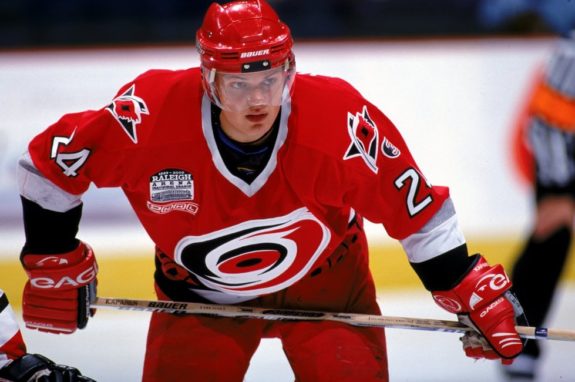
The 1997-98 season would be one of the finest of his career. In the first season once the Whalers had relocated and became the Carolina Hurricanes, Kapanen and Primeau tied exactly for the lead in team scoring – 81 games played, 26 goals, 37 assists and 63 points a piece. Kapanen would finish up the decade scoring 24 goals in both the 1998-99 and 1999-00 NHL seasons.
He would play another eight seasons in the league after 1999-00 came to a close. The second half of Kapanen’s career saw him become more of a defensive specialist and a very capable penalty-killer.
While his defensive prowess is certainly respectable and prolonged his NHL career, Kapanen’s combination of speed and scoring in the 1990s are what place him on our list in the first place. A talented player who may have had bigger numbers earlier in his career had he been on stronger teams.
#5 Jyrki Lumme
Of the four defenseman to make our list, Jyrki Lumme was the most offensively talented of the bunch. A smooth skater who could join the rush, he could also dish out tremendous passes too. Off the ice the bespectacled Finn looked more the role of a college professor. He certainly thought the game like one, and fired wristers with pinpoint accuracy.
Lumme was drafted in 1986 by the Montreal Canadiens. He played 21 games for the Habs during the 1988-89 season after coming over from Ilves of the SM-liiga – presently referred to simply Liiga – and colloquially known as the Finnish Elite League in English
Lumme remained with the Canadiens as the 1990s got underway, but found himself traded to the Vancouver Canucks at the 1990 NHL trade deadline in exchange for a second-round pick in 1991. He remained the Canucks best defender for most of the decade. From the 1990-91 season through 1993-94, Lumme’s assist totals went up every season – 27, 32, 36, and 42 helpers respectively.
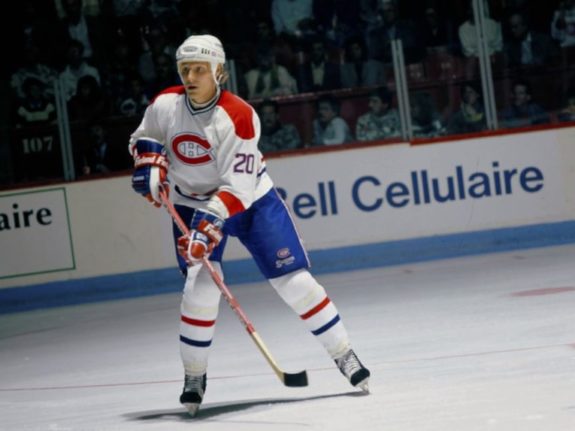
Lumme’s finest performance offensively came during the 1993-94 campaign when in 83 games he scored 13 goals and 42 assists for 55 points. He tied for fifth in Canucks team scoring that season alongside forward Murray Craven, and was the top scorer among all Vancouver blueliners. Subsequently, Lumme combined with fellow Canucks Pavel Bure, Trevor Linden and Kirk McLean to vault their team into the Stanley Cup Final. They would take the Rangers to seven games before losing in Game Seven by a 3-2 score.
The Finnish defender would have a similarly good offensive season in 1995-96 when he set a career high of 17 goals in 80 games to go along with 37 assists. Lumme would be the recipient of the Canucks’ Babe Pratt Trophy in 1992, 1994, 1996 and 1997 – awarded annually to the team’s best defenseman.
In the summer of 1998, he decided to test the free agent market. It would not take long for another team to seek out his services. On Jul. 3, 1998, Lumme signed with the Arizona (Phoenix) Coyotes. He would finish out the rest of the decade with the “Desert Dogs”.
From 1990-91 through 1998-99, Lumme would score 87 goals, 252 assists and 339 points in 628 games. Very consistent offensive numbers for a defenseman. Considering the fact that Lumme played almost his entire 15-year career with West Coast teams, he likely did not receive the appreciation that he deserved during his career. We feel that his ability to combine offense and defense into one placed him at fifth on our list.
#4 Saku Koivu
Saku Koivu was a Montreal Canadiens star player for so long that many forget that his career began in the 1990s. Having an illustrious career with Liiga’s TPS during his teenage years, he found immediate success when he came over to the NHL. The Canadiens drafted Koivu with the 21st selection of the 1993 NHL Draft. After scoring 74 points (27G, 47A) in 45 games for TPS during the 1994-95 season, he was more than ready to take on Montreal.
In Koivu’s rookie season – 1995-96 – he finished fifth in scoring for the Canadiens with 20 goals and 25 assists for 45 points. He did so while playing in all 82 games that season. Though he could certainly score, Koivu demonstrated early on an ability to be defensively responsible. Humble and respected by teammates and opponents alike, he was a tremendous competitor who quickly won the affection of some of the most hardened hockey fans. Koivu would finish fourth in voting for the NHL’s Rookie of the Year in this first season.
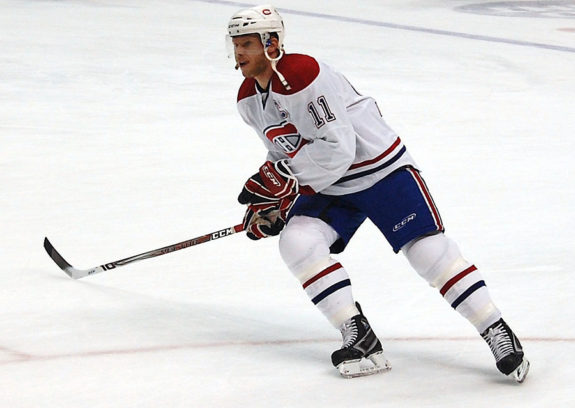
Koivu fought through a lot of injuries during his career. In his 18 NHL seasons, only eight times did he play 70 or more games in a season. Koivu even battled and defeated Burkitt’s lymphoma, a non-Hodgkin’s lymphoma cancer that caused him to miss almost the entire 2001-02 season. While the seasons of 1996-97 throughout the end of 1990s were injury maligned for him, he still scored at a decent clip. Looking at his numbers from 1995-96 through 1999-00, Koivu scored 68 goals and 155 assists for 223 points in just 290 games.
Koviu finished out the 1990s near the pinnacle of what it means to be a Montreal Canadien. On Sept. 30, 1999, he was named the 27th captain in team history and the first European-born captain at that. Koivu would hold the position for 10 seasons, which ties him with the great Jean Beliveau for longest tenured captains in Montreal history.
We place Saku Koivu at number-four on our list for his beautiful blend of offense, defense, leadership ability, and commitment to hockey. Those qualities came to the forefront in the 1990s, and permeated throughout his entire career.
#3 Jari Kurri
Hockey Hall of Famer Jari Kurri is the second Finn to be on both our 1990s and 1980s lists. He began the 1990s winning the fifth and final Stanley Cup of his career when he and the Edmonton Oilers won the championship in 1989-90. The remainder of the decade was in some ways a very different one for Kurri. While he still contributed offensively to the clubs he played for, he was nowhere near as prolific of a scorer as he had been the decade prior.
Instead, Kurri brought more defensive play and veteran leadership to the five different teams he played for during the 1990s, while still adding some offensive punch as well. After 1990 Cup-win, Kurri opted to play the 1990-91 season in Italy, as opposed to re-signing with the Oilers. The Los Angeles Kings would acquire his rights on May 30, 1991, which prompted him to return to the NHL where he would be reunited with his longtime partner Wayne Gretzky. Quite possibly the greatest duo in hockey history, Kurri and Gretzky would combine once more to bring offense to the West Coast.
From 1991-92 through 1993-94, Kurri provided numbers to the Kings of 23, 27 and 31 goals respectively. On Oct. 17, 1992, Kurri became the first European-trained player in NHL history to record his 500th goal. That same season he would add 60 assists onto his 27 goals, garnering an eighth All-Star Game selection in the process. Furthermore, he would help the Kings go on a run to the Stanley Cup Final – their first in team history – where they would ultimately lose to the Montreal Canadiens in five games. His nine playoff goals in 24 games that season tied him with Luc Robitaille for second on the team behind Gretzky’s 15.
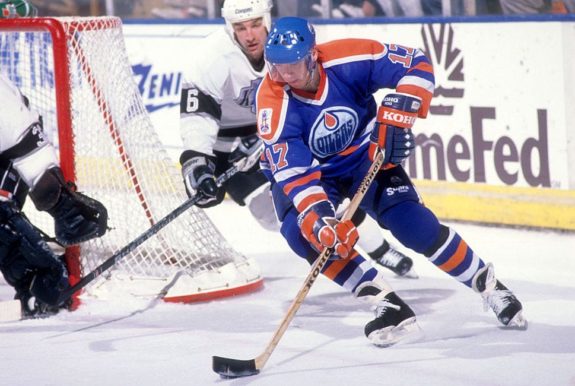
At the 1996 trade deadline, Kurri would be reunited with another of his former Edmonton teammates. The Kings would ship him, Shane Churla and Marty McSorley to New York Rangers – where they would join Mark Messier – in exchange for Ray Ferraro, Nathan LaFayette, Ian Laperriere, Mattias Norstrom and a fourth round selection in 1997. Kurri was good enough for eight points in 11 playoff games as “The Blueshirts” suffered a second-round playoff loss.
On Sept. 10, 1996, Kurri signed as a free agent with the Mighty Ducks of Anaheim. That season he was the only Duck to play in all 82 regular season games, scoring 13 goals, 22 assists and 35 points in the process. Kurri would also play in all 11 of Anaheim’s postseason games too.
His last hurrah came during the 1997-98 season. Once more Kurri signed as a free agent, but this time with the Colorado Avalanche. On Dec. 23, 1997 against the Kings, he scored the 600th goal of his NHL career. Kurri would also play in his ninth and final All-Star Game less than a month later.
With his commitment to the game, the production late in his carer, and his milestone achievements, Jari Kurri placed third on our list.
#2 Jere Lehtinen
While Jere Lehtinen’s best offensive seasons in the NHL came during the 2000s, it was in the 1990s that he broke into the league and demonstrated his ability to be quintessential for the success of the Dallas Stars. Furthermore, he needed very little time to establish himself as the best two-way player in hockey. Lehtinen was originally drafted during the team’s final season in Minnesota. The North Stars selected him in the fourth round of the 1992 NHL Draft. He would not make his debut until the 1995-96 season when the team was already well-situated in Dallas.
What truly accentuated his jump to the NHL was his success at the 1995 IIHF World Championship in Sweden. There Lehtinen played on a forward line with Koivu and Ville Peltonen. The trio was dubbed by Finnish fans as “Ankkalinnan pojat” – or “the boys of Duckburg” – referencing their nicknames of “Tupu, Hupu, Lupu” or anglicized as “Huey, Dewey, Louie”. Lehtinen, Koivu and Peltonen would combine for 28 points in eight games. With the Finns winning the gold medal, it became no real surprise when Lehtinen debuted for the Stars that coming season.
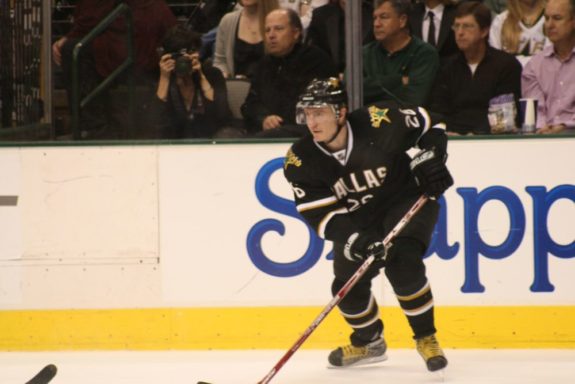
Keeping his defensive responsibilities first, Lehtinen scored six goals and 22 assists in 57 games during his rookie campaign. He would be named the NHL’s Rookie of the Month in February 1996. From there, he would up his goal totals to 16, 23 and 20 during the next three seasons.
While he remained in the top-10 scorers for the Stars from 1996-97 through 1998-99, that is not where Lehtinen’s primary value was. Shutting down opposing offensive threats, he would finish third in voting for the Frank J. Selke Trophy as the NHL’s Best Defensive Forward in only his sophomore season. Lehtinen would win the trophy outright in both the 1997-98 and 1998-99 seasons. No one was better than he was at neutralizing offenses those two seasons, and his ability to do so has remained underrated even to this day. Lehtinen would additionally be selected to the 1998 NHL All-Star Game.
Such defensive prowess combined with scoring ability culminated into the ultimate for Lehtinen and Dallas in 1998-99. In addition to winning his second Selke Trophy, the Finnish right wing and the Stars would hoist the Stanley Cup by defeating the Buffalo Sabres in six games during the Cup Final. Lehtinen’s 10 goals in 23 playoff games were tied for second-most for both Dallas and the entire league.
The Stars retired his #26 in 2017, and deservedly so. Were it not for the player named to the top spot on our list, Lehtinen himself would have been our number-one.
#1 Teemu Selänne
Teemu Selänne is the number-one overall player on our list, and it should be expected. He stunned the hockey world in 1992-93 when he scored an astounding 76 goals and 132 points in 84 games with the Winnipeg Jets. Both numbers remain NHL records for a rookie to this day, with the 76 goals being one that will likely never be broken. Before the 1990s ended, Selänne would have seasons of 40, 51, 52 and 47 as well.
Nicknamed “The Finnish Flash”, the Jets drafted Selänne with the 10th pick of the 1988 NHL Draft. While it would take four full seasons before he would debut in North America, it was well worth the wait. His 76 goals that season tied him with Alexander Mogilny for the most in the NHL. Selänne would also be a point-per-game player in that season’s playoffs as he scored four more goals and two assists in six postseason contests. His incredible performance earned him the 1992-93 Calder Trophy, hands down.
The remainder of Selänne’s time in Winnipeg was somewhat limited. Injuries kept him to 51 games in 1993-94, but he still managed 25 goals, 29 assists and 54 points. The 1994-95 season was shortened by a lockout, but Selänne still generated 22 goals, 26 assists and 48 points in 45 games.
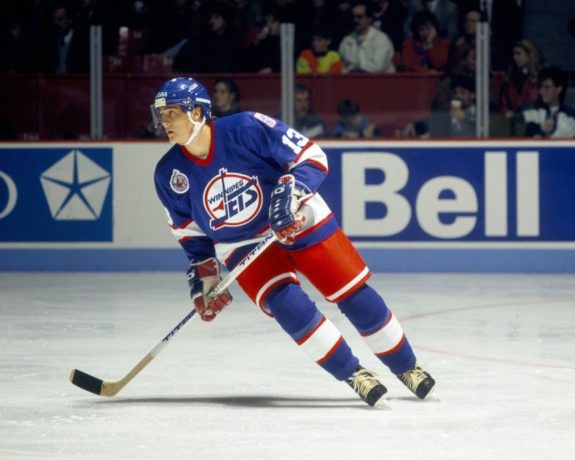
Never recapturing the same scoring pace as his rookie season, Winnipeg shockingly must have considered the Finnish right winger to be expendable. On Feb. 6, 1996 the Jets traded Selänne to the Mighty Ducks of Anaheim along with Marc Chouinard and a fourth-round pick in that year’s draft in exchange for Oleg Tverdovsky, Chad Kilger and a third-rounder.
Selänne would finish out the decade as a Duck. He would reach 109 points in 1996-97 and 107 points in 1998-99 – the final 100-point seasons of his 21 seasons in the NHL. Between the 1992-93 and 1998-99 seasons, Selänne scored 313 goals in just 485 games. Scoring 47 goals by the end of the 1998-99 season, he became the first player in NHL history to receive the “Rocket” Richard Trophy for leading the league in goals.
Selänne would be named an NHL First Team All-Star in 1992-93 and 1996-97. He would be a Second Team All-Star in 1997-98 and 1998-99. Eventually winning the Stanley Cup much later in 2006-07, Selänne’s statistical and playing successes of the 1990s made him a lock for the Hockey Hall of Fame. He received induction in 2017.
The Honorable Mentions:
We recognize that not all of the great Finnish players of the 1990s played in the NHL, or if they did, they may not have had the longest stay. We would like to discuss a few Finnish players who had tremendous careers both in international play and in the Liiga. While these players may not have been household names in North America, they certainly were in their homeland.
Goaltender Jarmo Myllys had a career that lasted well more than 20 years. A name not entirely familiar among current North American fans, he is one of the greatest Finnish goaltenders to ever play. Initially beginning his career with Liiga’s Ilves during the 1983-84 season, Myllys would be drafted by the Minnesota North Stars in the ninth round of the 1987 NHL Draft.
From 1988-89 through 1990-91, he would play a total of 12 games for Minnesota. When the San Jose Sharks entered the NHL as an expansion team in 1991-92, Myllys became a full-time NHLer. The Sharks acquired him as part of the 1991 Dispersal Draft. Myllys would man the nets for 27 games during the 1991-92 season as an original member of the Sharks.
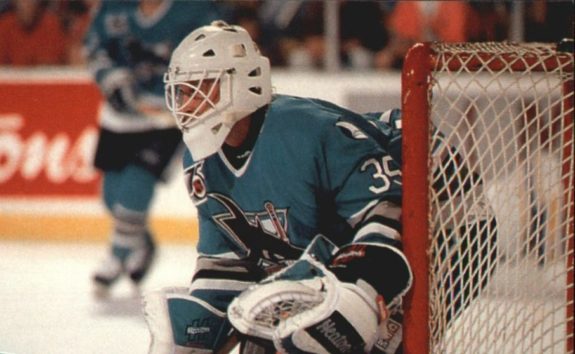
Returning to Europe after a lone season with San Jose, Myllys would play the majority of the 1990s with Luleå HF in the Svenska hockeyligan (SHL), often anglicized as the Swedish Elite League. He would win numerous SHL and international awards during the 1990s, including an SHL Championship and two Olympic bronze medals for Finland.
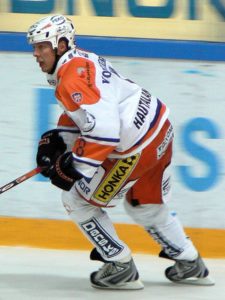
Myllys retired after the 2004-05 season with Liiga’s Saimaan Pallo (SaiPa). At the close of his career, he had won three Olympic medals (one silver, two bronze), World Championship gold and three silvers, two SHL championships and one Liiga championship. Luleå retired his Myllys’ jersey in 2011.
Similar to Myllys, Janne Ojanen had an extensive hockey career that lasted for 26 professional seasons. He played parts of four seasons with the New Jersey Devils spanning from 1988-89 through 1992-93. At 6-foot-2 and over 200 pounds, Ojanen had good size and a great scoring touch which led to the Devils selecting him in the third round of the 1986 NHL Draft.
Ojanen scored 21 goals and 23 assists for 44 points in 98 NHL games for New Jersey. Returning to his homeland beginning with the 1993-94 season, he became one of Liiga’s most dominating players for the 1990s and 2000s. In 876 Liiga games, Ojanen scored 283 goals, 516 assists and 799 points – the most assists and the most points in Liiga history.
When Ojanen retired after the 2009-10 season, his career included Olympic silver and bronze medals, four Liiga championships, and World Championship gold and silver.